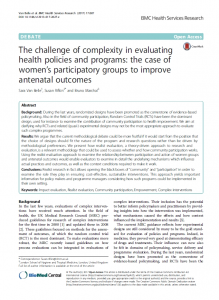
Background: During the last years, randomized designs have been promoted as the cornerstone of evidence-based policymaking. Also in the field of community participation, Random Control Trials (RCTs) have been the dominant design, used for instance to examine the contribution of community participation to health improvement. We aim at clarifying why RCTs and related (quasi-) experimental designs may not be the most appropriate approach to evaluate such complex programmes.
Results: We argue that the current methodological debate could be more fruitful if it would start from the position that the choice of designs should fit the nature of the program and research questions rather than be driven by methodological preferences. We present how realist evaluation, a theory-driven approach to research and evaluation, is a relevant methodology that could be used to assess whether and how community participation works. Using the realist evaluation approach to examine the relationship between participation and action of women groups and antenatal outcomes would enable evaluators to examine in detail the underlying mechanisms which influence actual practices and outcomes, as well as the context conditions required to make it work.
Conclusions: Realist research in fact allows opening the black boxes of “community” and “participation” in order to examine the role they play in ensuring cost-effective, sustainable interventions. This approach yields important information for policy makers and programme managers considering how such programs could be implemented in their own setting.